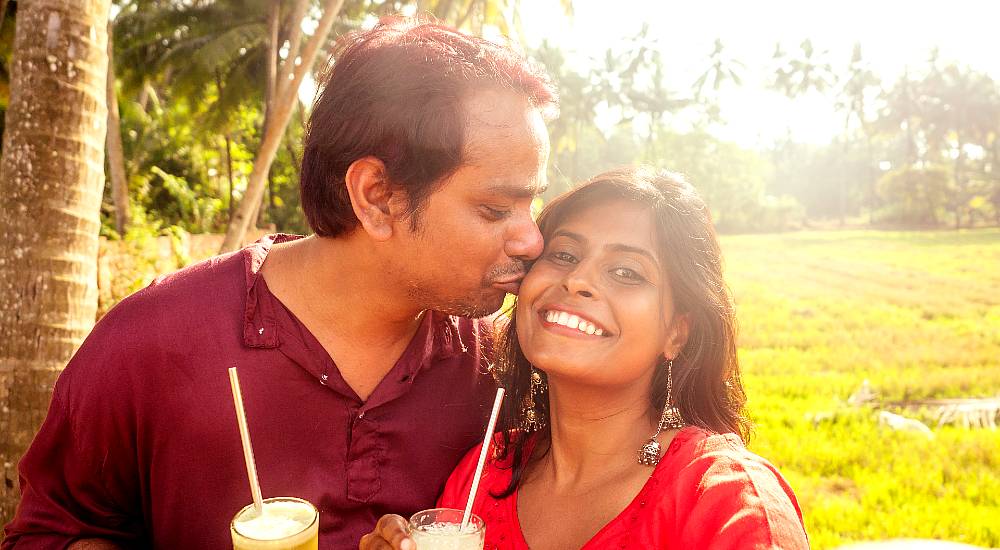Arranged marriages have long been a prominent part of Indian culture. In this traditional practice, families play a crucial role in finding suitable partners for their children based on factors such as social status, religion, and family background. The belief behind arranged marriages is that parents have a better understanding of their children’s needs and can make more objective decisions when it comes to finding a life partner. This practice has been deeply ingrained in Indian society for centuries, but in recent years, a new trend has emerged – online dating.
The rise of online dating in India
With the advent of the internet and smartphones, online dating has gained significant popularity in India. The younger generation, especially urban millennials, have embraced this new way of meeting potential partners. Online dating platforms provide a convenient and accessible avenue for individuals to connect with like-minded people beyond their immediate social circle. It offers a level of freedom and autonomy in choosing a partner that was previously unheard of in the context of arranged marriages.
Factors contributing to the shift in the dating scene
Several factors have contributed to the shift in the dating scene in India. Firstly, the influence of western culture and globalization has played a significant role in changing societal attitudes towards relationships and marriage. Young Indians are increasingly exposed to different perspectives on love and romance through movies, TV shows, and social media, which has led to a desire for more freedom in choosing their partners.
Secondly, the rapid growth of technology and the internet has made online dating platforms easily accessible, even in remote parts of the country. The increasing penetration of smartphones and affordable data plans has further accelerated the adoption of online dating among Indian youth.
Lastly, the changing demographics and urbanization have also played a role. As more young Indians move to cities for education and employment opportunities, they are exposed to diverse cultures and lifestyles, leading to a broader mindset when it comes to relationships.
Online dating statistics in India
The rise of online dating in India can be seen in the numbers. According to a survey conducted by the Indian Institute of Technology Delhi, around 15% of Indian youth have used online dating platforms to find a partner. This number is expected to grow as more people become comfortable with the idea of online dating.
Interestingly, the survey also revealed that a significant portion of online daters in India still prefer to keep their dating activities discreet due to societal pressures and the fear of being judged. This highlights the complex dynamics between traditional values and modern dating practices in Indian society.
- According to a survey conducted by Tantan, one of the leading dating apps in India, there has been a significant increase in online dating activity in recent years.
- In 2020, India witnessed a 39% growth in online dating app downloads, indicating a growing interest in online dating platforms.
- The survey revealed that the majority of online daters in India fall within the age range of 18-34, with more men than women actively using these apps.
- Interestingly, the COVID-19 pandemic has also played a role in the surge of online dating, with people turning to digital platforms to meet new people while adhering to social distancing guidelines.
- The survey further showed that urban cities like Delhi, Mumbai, and Bengaluru have the highest concentration of online daters in India.
- Additionally, the study found that the most common reason for using dating apps in India is to find a serious and long-term relationship, followed by casual dating and making new friends.
- Indian users also prioritize security and privacy when it comes to online dating, with a growing concern about the authenticity of profiles and the safety of personal information.
- In terms of preferences, the survey revealed that Indian daters value compatibility in terms of interests, values, and lifestyle, rather than solely relying on physical appearance.
- As the online dating market in India continues to grow, more dating apps are emerging, catering to specific niches and interests, such as religion-based dating apps like Dil Mil for the Indian diaspora or Aisle for those seeking serious relationships.
- Overall, online dating in India is rapidly evolving, with more people embracing the convenience and opportunities that digital platforms offer for meeting potential partners.
Pros and cons of arranged marriages
Arranged marriages have their own set of advantages and disadvantages. On one hand, the involvement of families and matchmakers ensures a thorough screening process, reducing the chances of incompatible matches. Additionally, arranged marriages are often seen as a union between families rather than just individuals, fostering a sense of community and support.
However, arranged marriages also come with limitations. The lack of personal choice and the pressure to conform to societal expectations can lead to unhappy unions. Moreover, the emphasis on compatibility based on socioeconomic factors often overlooks emotional compatibility, which is crucial for a successful relationship.
- Arranged marriages are a common practice in India, where families play a significant role in finding suitable partners for their children.
- The decision to enter into an arranged marriage is often based on factors such as caste, religion, social status, and family background.
- The process of arranged marriages typically involves the parents or elders of the prospective bride and groom searching for suitable matches within their community or through matchmakers.
- In many cases, the families rely on recommendations from relatives, friends, or trusted community members to find potential partners.
- Once a potential match is identified, the families usually exchange biodata or resumes that contain details about the individual’s education, occupation, family background, and other relevant information.
- If both families agree to proceed, a meeting or formal introduction between the prospective couple is arranged, often facilitated by family members or intermediaries.
- During these meetings, the couple may have an opportunity to get to know each other and discuss their compatibility, values, and expectations for the marriage.
- It is important to note that the level of involvement and autonomy of the couple in the decision-making process can vary depending on the family and regional customs.
- Once the couple agrees to the marriage, a formal engagement ceremony is conducted, followed by wedding preparations, including the setting of a wedding date and other traditional rituals.
- In arranged marriages, the emphasis is often placed on the union of two families rather than solely on the individual preferences of the couple.
- While arranged marriages have faced criticism for limiting individual choice and autonomy, many couples in India have successful and fulfilling marriages that are arranged by their families.
- It is worth mentioning that the practice of arranged marriages is not exclusive to India, as it is also prevalent in other cultures and regions around the world.
Pros and cons of online dating
Online dating offers a range of benefits that have appealed to the Indian youth. One of the major advantages is the ability to connect with a diverse pool of potential partners who share similar interests and values. This widens the dating options beyond traditional boundaries and allows individuals to find someone compatible with their lifestyle and aspirations.
However, online dating is not without its downsides. Catfishing, where individuals create fake profiles, is a common concern. Additionally, the online dating landscape can be overwhelming, with the constant need to swipe and make decisions based on limited information. It can also lead to a superficial approach to dating, where appearances take precedence over deeper connections.
How online dating has impacted traditional dating practices in India
The rise of online dating has undoubtedly impacted traditional dating practices in India. While arranged marriages still prevail, online dating has introduced a new dynamic to the dating scene. Young Indians now have the option to explore relationships outside of their immediate social circle and make choices based on personal preferences.
Online dating has also challenged the notion of caste and religion-based barriers that often come with arranged marriages. People are now more open to dating individuals from different backgrounds, breaking down long-standing prejudices and promoting inclusivity.
Success stories from online dating in India
Online dating in India has witnessed its fair share of success stories. Many individuals have found their life partners through online platforms and have shared their stories of finding love beyond traditional boundaries. These success stories serve as inspiration for those who are hesitant to try online dating and highlight the potential for meaningful connections in the digital age.
Challenges faced by online daters in India
While online dating has its advantages, it also comes with certain challenges. One of the main hurdles is the stigma associated with online dating in Indian society. Many people still view it as a taboo or desperate measure, which can discourage individuals from exploring this avenue.
Another challenge is the issue of safety and privacy. Online dating platforms need to prioritize user security and implement measures to prevent harassment and abuse. Additionally, individuals need to exercise caution and be mindful of their personal information while engaging in online dating.
The future of dating in India: Will online dating replace arranged marriages?
While online dating has gained popularity in India, it is unlikely to completely replace arranged marriages. The concept of arranged marriages is deeply rooted in Indian culture and continues to hold significance for many families. However, online dating will continue to coexist and provide an alternative for those seeking greater autonomy and freedom in choosing their life partners.
The future of dating in India will likely involve a blend of traditional and modern practices. Arranged marriages may become more flexible, allowing individuals to have a say in the decision-making process. Online dating platforms will continue to evolve, incorporating features that address the unique needs and concerns of the Indian market.
Conclusion
The dating scene in India has witnessed a significant transformation, from the age-old practice of arranged marriages to the rise of online dating. While arranged marriages remain an integral part of Indian culture, online dating has introduced a new level of freedom and choice for individuals in search of love. The shift in the dating scene can be attributed to various factors, including globalization, technological advancements, and changing societal attitudes. While online dating has its own set of advantages and challenges, it has undoubtedly impacted traditional dating practices in India. The future of dating in India will likely involve a harmonious blend of traditional and modern approaches, offering individuals the opportunity to find love on their own terms.
Daring writers who explore topics related to dating, love, and relationships. Submit your article here









